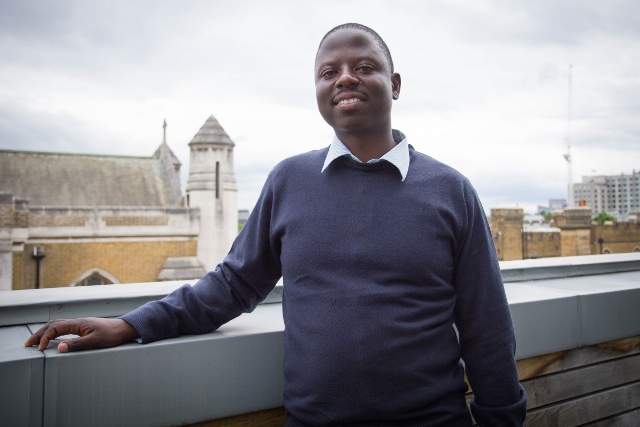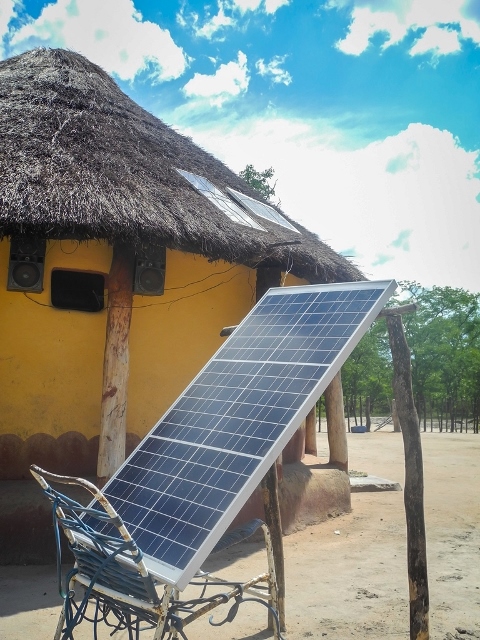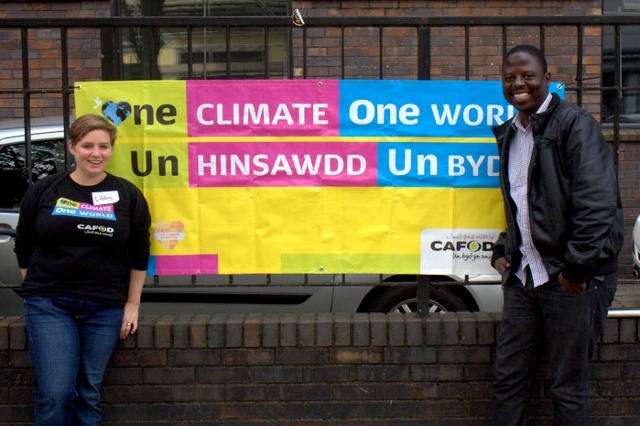How people in Zimbabwe are fighting back against climate change with renewable energy
Takura Gwatinyanya works for CAFOD partner Caritas Harare in Zimbabwe. He recently met CAFOD supporters in England and Wales to talk about how Caritas Harare is using renewable energy to help to tackle the effects of climate change in the southern African country.

Pope Francis warns in Laudato Si’ that our interference with nature is particularly affecting areas in which the poorest people live.
This is all too evident for the communities that Takura and Caritas Harare serve in Zimbabwe. As we have caused the climate to warm, drought has dried up people’s water supplies, destroyed their crops and livelihoods, and increased the spread of diseases such as cholera, typhoid, and diarrhoea.
Speak up to your MP for action on climate change
Takura recently visited parishes around England and Wales to talk about how the support of Catholics in this country is enabling people in Zimbabwe to overcome the challenges thrown at them by our exploitation of nature.
Climate change’s impact
“Sixty percent of people in Zimbabwe live in rural areas,” said Takura, “and most of these people rely on farming for their livelihoods. Climate change has resulted in very low rainfall which has greatly affected agriculture. Plants are wilting and dying. Crops are not maturing because of the short rainy seasons. The rainy season normally lasts five months – which is long enough for crops to mature – but now the rains only last two months and there are long dry periods between those two months. This greatly affects crop development and has resulted in a food crisis.
“People don’t have access to clean water. This mainly affects women and girl children as culturally it’s their duty to do housework and fetch water. They have to walk long distances to get it. When they get to the water, the wells are broken down. Women rise before 4 o’clock in the morning. Girls have to look for water before school. They are tired at school. For women, most of their productive time is lost. For girls, it can lead to school drop-outs.”
Speak up in solidarity with people affected by climate change
Takura explained how the effects of climate change reached beyond just food and water security.
“Climate change is also affecting dams. They are supposed to be at full capacity in June, but some are running out and this has affected energy generation. We used to rely on hydroelectric power, but with dams going down, we constantly have challenges.”
Working with nature instead of against it
In the face of these problems, it’s inspiring that Caritas Harare is working with nature rather than against it to help people lift themselves out of poverty.

“Solar power has greatly improved access to water,” said Takura. “Renewable energy has helped people have greater food security because farmers can irrigate their land and then eat and sell the vegetables they grow.
“It has reduced the burden on women. Solar-powered pumps bring water to the communities themselves and so decrease walking distances and the time taken to fetch water. The water can also be used by schools and clinics. In turn, this increased access to water has improved health.”
Ask your MP to bring renewable energy to the world’s poorest communities
Takura also described how working with nature helps with the growing and cooking of food.
“Caritas Harare is promoting drought-resistant, early-maturing plants such as cow peas. They take two months to mature and they don’t require a lot of water. We’re providing seeds with other Church partners and this would help the country more widely if scaled up.
“We’re also promoting the use of biomass from natural waste products to produce energy. Some schools use firewood for cooking and have a spending budget of $1,000 every term for firewood which is a significant amount. Firewood also causes massive deforestation which depletes our environment and adds to climate change. But biomass is going to reduce the cost of energy by councils and schools and the money saved can be channelled to other productive uses.”
A challenge to us all

Despite the new tools that Caritas Harare is using to help people cope in the battle against nature, Takura had a message for the people he met in England and Wales.
“People in Zimbabwe would want to say to people in England and Wales that they need your support to enable them to scale up their productive capacity in agriculture through the use of renewable energy. More resources need to be channelled to supporting renewable energy.”
“I hope that people will be more conscious of their actions towards the environment and become more climate-smart. We need to reduce emissions and the throwaway culture.”
Join CAFOD and The Climate Coalition in the fight against climate change
Reblogged this on Ascension Youth Ministry and commented:
A short but eye-opening look at how climate change is affecting societies and what can be done about it.